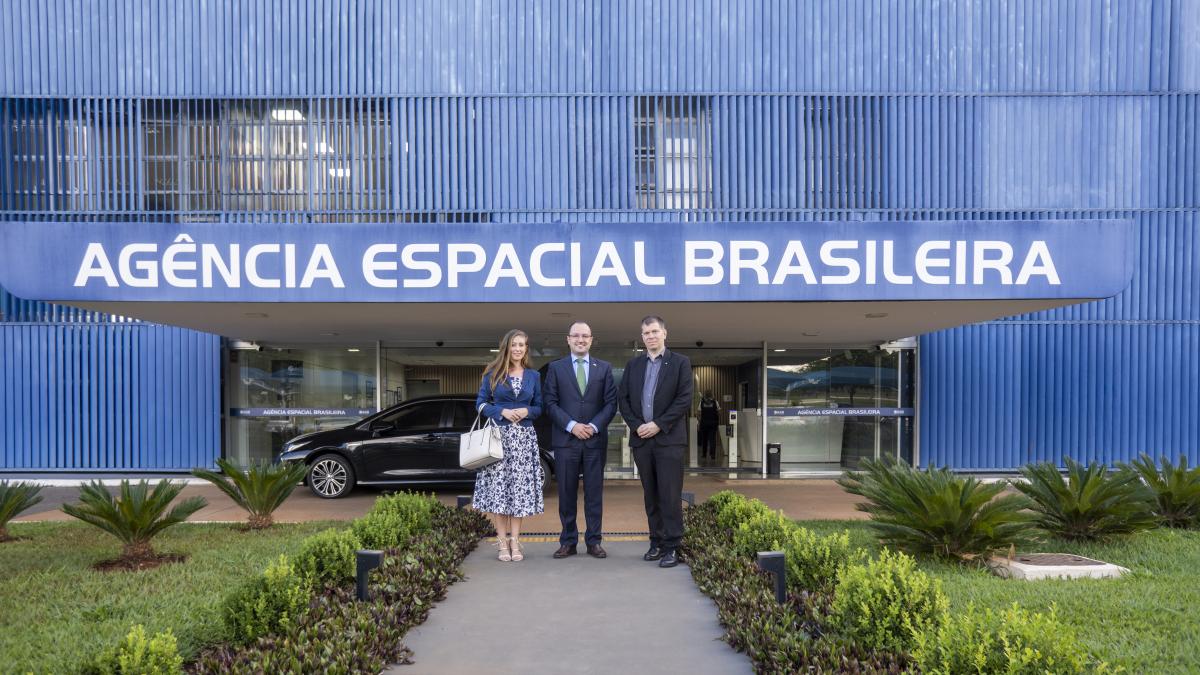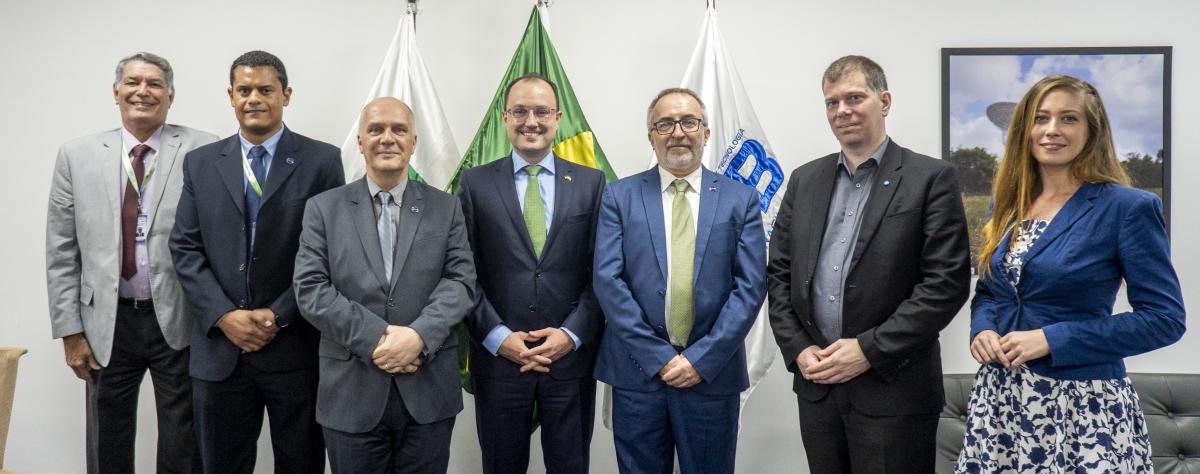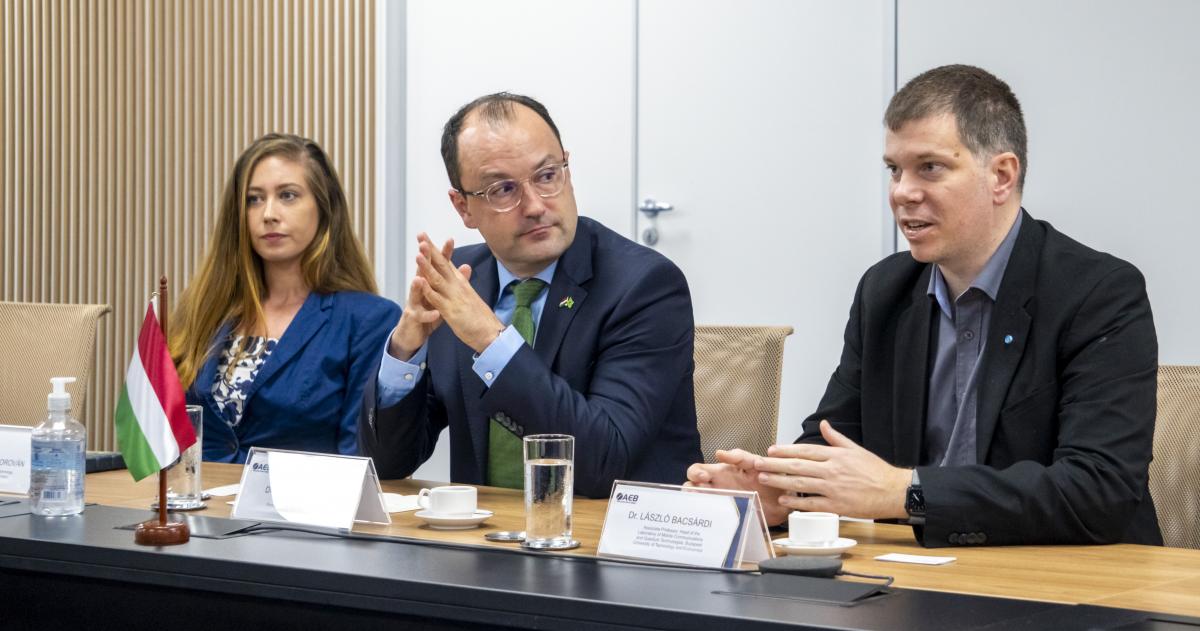News feed
Developing Hungarian-Brazilian Space Relations
2024. 01. 31.At the end of last year in Brazil, László Bacsárdi – Associate Professor at the Faculty of Electrical Engineering and Informatics of BME – attended several talks on space research.
Among others, László Bacsárdi met with the President of the Brazilian Space Agency after travelling to Brazil late last year at the invitation of the Consulate General of São Paulo. During the meeting with President Dr Marco Antonio Chamon and his colleagues, they discussed several areas which may be relevant for the Hungarian space sector. They also touched upon Hungarian space education programmes, including the Master's programme in aerospace engineering managed by the Faculty of Electrical Engineering and Informatics (VIK). In his capacity as the supervisor of the Master in Space Engineering, he met with Dr Ronne Toledo – Head of Space Education at the University of Brasilia – to discuss cooperation in space education, and then with Dr Clezio Marcos de Nardin – Director of the National Institute of Space Research of Brazil – to discuss cooperation possibilities in space research and education. We asked Dr Bacsárdi about the outcome of the talks.

What are your thoughts on the meetings?
I’d say my trip was successful. The itinerary was quite tight, so in my five working days in Brazil, I visited three cities: Brasília, São José dos Campos, and São Paulo. My schedule was organised by the Consulate General in São Paulo, with the support of the Embassy of Hungary in Brazil for the events in Brasília on Monday and Tuesday. The appointments allowed me to gain an insight into Brazil’s space activities, and we found points of mutual interest for everyone involved.

What specific areas were covered in your discussions with Dr Marco Antonio Chamon?
The principal purpose of the meeting was to expand the technical content of the Brazilian-Hungarian intergovernmental agreement on space research concluded in 2019. I visited Brazil not only in my capacity as a BME lecturer, but also as the vice-president of the Hungarian Astronautical Society, the oldest Hungarian space research association, as the chairman of the editorial board of the Hungarian Space Kaleidoscope, a publication on the Hungarian space sector, and as a member of the Hungarian expert group delegated to the European Space Agency. This has allowed me to present our space activities from an academic, social and industrial point of view, as I have an insight into European space activities as well as domestic ones. The meeting started with Ambassador Dr Miklós Halmai briefly outlining its background, and then we discussed technical topics such as space communications, Earth observation, human spaceflight, quantum communications, and education.

What opportunities do you see for recruiting Brazilian students to the VIK Master of Aerospace Engineering degree and for educational and research cooperation with the space education programmes offered by the University of Brasilia?
I was very impressed by my visit to the Gama campus of the University of Brasilia – this campus is home to the space education department, among others. In the company of Júlia Morován, Science and Technology attaché, I met the local student rocketry team and team working on the development of small satellites. I also had the chance to visit some very well-equipped engineering labs. I see many promising opportunities for collaboration, whether it's the Stipendium Hungaricum, different scholarship programmes or other R&D proposals. As for education, there is the four-semester master's programme in aerospace engineering run by VIK, and the three-semester remote postgraduate programme in space technology run by 11 universities in the framework of the UniSpace space cooperation programme. For students, simply spending a few months in another country and gaining insight into their space-related developments can be a great experience. And the location of the two countries would allow Brazilians to make contact with their own satellites passing over Europe through us, and vice versa.
What will be the next step in developing these relations?
Following my trip organised by the Consulate General in São Paulo, we identified a number of tasks in cooperation with them and the Department for Space Policy and Space Activities of the Ministry of Foreign Affairs and Trade of Hungary. Over the coming weeks, we would like to check off as many items on this to-do list as possible. At the end of April, we are organising an international space conference – H-SPACE 2024 (http://space.bme.hu) – at BME in cooperation with the Hungarian Astronautical Society. This will be our 8th international conference in a series of conferences launched in 2015, first held annually and then every two years. I have invited Dr Clezio Marcos de Nardin, Director of the National Institute of Space Research of Brazil, to the conference, and asked him to give a keynote speech. I trust that he will be able to fit our event into his schedule and that we will be able to continue the discussion we started in person back in Brazil. We have also agreed with the Head of Space Education at the University of Brasilia to prepare the conclusion of a cooperation agreement between our universities.
KJ
Photos: László Bacsardi
